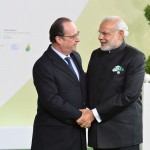Obama, Abe, Hollande. Each time the leader of a friendly nation visits India, a perception is created that India is closest to that country. Hence, dispassionate reflection is essential to assess the recent visit of the French president and India-France relations.
First, the symbolism: Hollande’s visit as chief guest at the recent Republic Day celebrations is the fifth occasion a French leader received the honour. In January 1976, Prime Minister Chirac was chief guest. At an Elysée Palace reception before his departure for New Delhi, he excitedly peppered this author, then a young diplomat at the embassy in Paris, with numerous questions about the parade and Rashtrapati Bhavan. Forty years later, President Hollande displayed the same excitement about the parade at Rajpath, and hinted that the French might emulate its features of joie de vivre.
No other country has enjoyed this privilege five times. The two countries have a marked convergence in their world views. Both are keen to nurture their strategic partnership. Looking at Asia, France is conscious of the weight and rise of both China and India. A natural empathy has long existed between independence as a defining feature of French foreign policy and strategic autonomy—or encouragement of multipolarism—favoured by India.
As India views today’s Europe beset with multiple problems, it consciously focuses on cementing cooperation with three key powers: Germany, Britain, and France. A variable blend of history, diaspora, business, politics and strategy comes into play with each of them, but France was the first—in 1998—to establish a strategic partnership with India.
Within Europe, India’s strategic partnership with France is “the most comprehensive”, and compares well even with India-U.S. relations “in a historical time frame”, writes former foreign secretary Kanwal Sibal. Yet, its full potential has not been secured.
The triad of defence, nuclear energy, and space cooperation has blossomed steadily, but there is delay in finalising intergovernmental agreement on India’s purchase of 36 Rafale fighter planes, announced by Prime Minister Modi during his visit to France last April. Most issues appear settled, including the offset issue, but differences on price persisted during Hollande’s visit. A key factor behind France’s inflexibility is Dassault’s order books are getting full.
There is also the EPR nuclear power project at Jaitapur in Maharashtra. Two reactor units were agreed to, but discussions with Hollande resulted in the decision for six units, for which further negotiations are necessary, which might stretch to years when India’s energy requirements are pressing. Hope lies in the governments’ pledge to begin implementation in early 2017.
Several positive developments need to be appreciated. Cooperation on counterterrorism is getting consolidated. As victims of major terrorist attacks around the same time—“Paris to Pathankot”, the two countries will develop “exchanges in the fields of intelligence, finance, justice, and police”. The recent visit to Paris of National Security Advisor Ajit Doval is a precursor to tangible, though quiet cooperation.
Dialogue on maritime security should gather momentum if the first session recently held in Paris is any guide. The Reunion Islands of France make it an Indian Ocean power, but there is a long record of bilateral naval cooperation.
The two countries work closely on the matrix of environment and renewable energy. The French appreciated India’s cooperative approach at COP-21, held in Paris, reciprocating by enthusiastically supporting Prime Minister Modi’s International Solar Alliance (ISA) intitiative. The critical challenge before ISA is to secure euro 2 billion ($2,181,990,452) for development of renewable energy technologies, but the French have already pledged euro 300 million ($327,395,079).
The economic dimension is still underdeveloped. Trade (approximately euro 8 billion—$8,730,458,878—in 2014) and investment figures do not look impressive when compared with Indo-British and Indo-German exchanges, but some 750 ‘big’ French companies are already present in India. France Inc. has accepted the logic of the Make in India initiative, and 16 memoranda of understanding and agreements were signed at the Business Summit in Chandigarh on January 24. These indicate a wide-ranging fit of needs and capabilities: three relate to smart cities (Nagpur, Chandigarh, and Puducherry); nine involve urban sector development; two are solar photovoltaic projects; and one is a wind-based power project. Additionally, Mahindra-Airbus cooperation would create ‘a “new private strategic partner” for helicopters within the Make in India programme.
A key driver in the EU, France has a critical role to play in mending the complicated ties between India and the EU, paving the way for conclusion of the long-pending free trade agreement between them. Once this is achieved, Indo-French trade may increase quickly.
No France-related discussion could be complete without a reference to culture, cuisine, arts, education and people-to-people relations. Much has been happening on this front. Cultural festivals have become a regular feature. One may suggest that a critical audit of the 34 agreements, signed during Modi and Hollande visits, should be undertaken in a year’s time and its outcome be placed in public domain. Continued support from people is a must for lifting this special relationship to a higher level.
Rajiv Bhatia is Distinguished Fellow, Foreign Policy Studies Programme at Gateway House, former ambassador to Myanmar, and author of ‘India-Myanmar Relations: Changing contours’ (Routledge).
This article was exclusively written for Gateway House: Indian Council on Global Relations. You can read more exclusive content here.
For interview requests with the author, or for permission to republish, please contact outreach@gatewayhouse.in.
© Copyright 2016 Gateway House: Indian Council on Global Relations. All rights reserved. Any unauthorized copying or reproduction is strictly prohibited.


